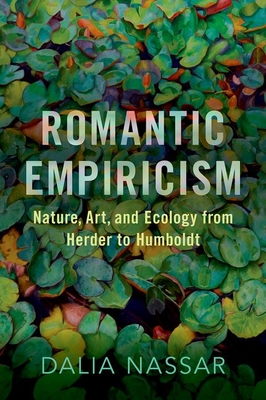Romantic Empiricism: Nature, Art, and Ecology from Herder to Humboldt

Romantic Empiricism: Nature, Art, and Ecology from Herder to Humboldt
In Romantic Empiricism, Dalia Nassar distinguishes and explores an understudied philosophical tradition that emerged in Germany in the late eighteenth and early nineteenth centuries, traces its development, and argues for its continued significance. Moving from the late Kant's notion of reflecting judgment, to Herder's articulation of the idea of "animal worlds," Goethe's explication of the obligations of the scientist, and Alexander von Humboldt's aesthetic science, Nassar demonstrates how these thinkers developed a sophisticated empirical approach to the natural world, which focuses on the phenomenon while also recognizing the creative role of the knowing subject and the cognitive value of art and aesthetic experience. She explores how these four thinkers worked together-sometimes as rivals, but more often than not as teachers and collaborators-and illustrates how their search for a new methodology culminated in a new, ecological understanding of the world and the human place
within it. Revisiting their thought, especially their distinctive approach to the study of nature, Nassar demonstrates, has the potential to redirect contemporary environmental debates and respond to urgent ecological questions in new and productive ways.
PRP: 785.33 Lei
Acesta este Pretul Recomandat de Producator. Pretul de vanzare al produsului este afisat mai jos.
706.80Lei
706.80Lei
785.33 LeiLivrare in 2-4 saptamani
Descrierea produsului
In Romantic Empiricism, Dalia Nassar distinguishes and explores an understudied philosophical tradition that emerged in Germany in the late eighteenth and early nineteenth centuries, traces its development, and argues for its continued significance. Moving from the late Kant's notion of reflecting judgment, to Herder's articulation of the idea of "animal worlds," Goethe's explication of the obligations of the scientist, and Alexander von Humboldt's aesthetic science, Nassar demonstrates how these thinkers developed a sophisticated empirical approach to the natural world, which focuses on the phenomenon while also recognizing the creative role of the knowing subject and the cognitive value of art and aesthetic experience. She explores how these four thinkers worked together-sometimes as rivals, but more often than not as teachers and collaborators-and illustrates how their search for a new methodology culminated in a new, ecological understanding of the world and the human place
within it. Revisiting their thought, especially their distinctive approach to the study of nature, Nassar demonstrates, has the potential to redirect contemporary environmental debates and respond to urgent ecological questions in new and productive ways.
Detaliile produsului









